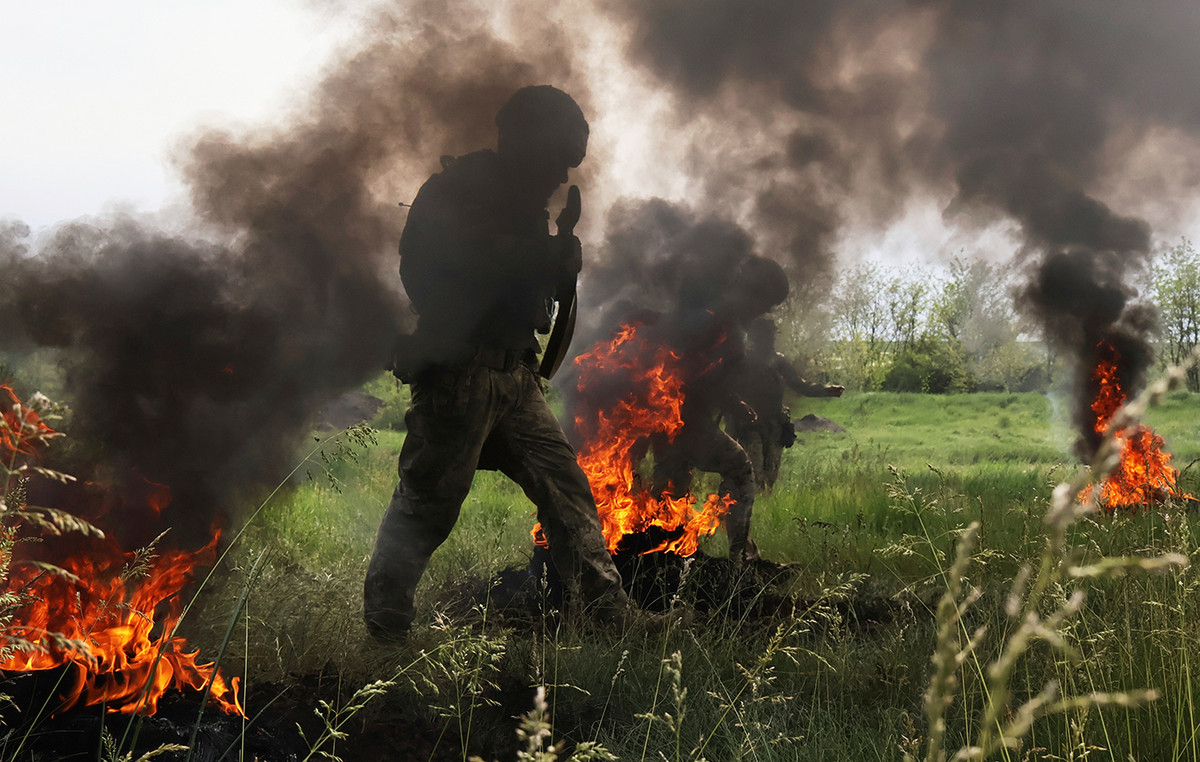One in five people in the Gaza Strip faces hunger, which already reaches the entire territory of the Enclave, alerts a new United Nations report after almost three months of Israeli blockade to extremely necessary humanitarian aid.
The warning comes at the time the UN and several NGOs, as well as civilians in Gaza, say the situation has deteriorated since Israel launched its new attack on Enclave in March, while residents struggle to access food, medicine and drinking water.
The entire Enclave population is facing “high levels of acute food insecurity” and the territory runs “high risk” of hunger, the most serious type of hunger crisis, the Integrated Food Security Phases (IPC) classification in its last report, released on Monday (19).
“The goods indispensable to people’s survival are exhausted or should end in the coming weeks,” the IPC said. The food is running out and the little left is being sold at exorbitant prices that few can pay, he said.
Israel imposed a humanitarian blockade on Gaza on March 2, cutting the supply of food, medical supplies and other aids to more than 2 million Palestinians living in the territory. Israel states that the blockade, along with the expansion of military bombing in Gaza, aims to press Hamas to release hostages on the enclave – but international organizations claim that it violates international law, with some accusing Israel of using inanition as a weapon of war.
There is a “high risk” that hunger will occur between now and late September, warned the IPC report, leaving most people in Gaza without access to food, water, shelter and medicines.
“Only immediate and sustained cessation of hostilities and the resumption of humanitarian aid delivery can avoid a decay of hunger,” the report says.
According to the IPC system – a five -phase scale used to measure the severity of food insecurity – a hunger situation can only be declared if the data show that certain limits have been reached. These conditions are: at least 20% of all families should face extreme food scarcity, 30% or more of children should be severely malnourished and at least 2 out of 10,000 people die every day due to absolute hunger or interaction between malnutrition and disease.
The first limit has already been reached, according to the IPC. Almost 469,500 people – about 22% of the population – will probably face a “catastrophic” food insecurity situation, the highest phase on the IPC scale, between May and September, according to the report.
David Mencer, spokesman for Israeli Prime Minister Benjamin Netanyahu, said on Monday that “never hunger” in Gaza, despite the CPI alerts, and that if there is hunger in Gaza, it is caused by Hamas, which deprives humanitarian aid civilians.
Although it largely assigns Hamas to blame for increasing hunger levels, the US ambassador to Israel, Mike Huckabe, acknowledged on Friday the rapid deterioration of the situation in Gaza, telling the CNN “If there was no humanitarian crisis, there would be no effort to try to deal with it. Therefore, the answer is obviously, yes, there is a humanitarian crisis.”
Since March, Israel’s new attack has shifted more than 430,000 people, according to the report, interrupting essential services and the distribution of essential supplies.
All 25 bakeries administered by the UN World Food Program (PMA) were forced to close in early April due to lack of supplies, and foods are ending in most 177 hot dining kitchens, according to the IPC report. And food prices are firing.
Flour prices have increased by 3,000% since February, and a bag of 25 kilos of wheat flour can cost between $ 235 and $ 520, according to the report.
At a press conference on Monday, UN Secretary-General spokesman Stéphane Dujaric said that only “about 260,000 meals were prepared and delivered throughout the Gaza Strip” on Monday, which represents a 70% reduction compared to last Wednesday.
According to the spokesman, the block, which has passed 70 days, has sold out the food reserves of the UN agencies. “Inventories are over, bakeries have closed, community kitchens are closing daily and people are starving,” he said.
Pregnant women and children among those who are at the highest risk
Pregnant children and women are at particular risk. Almost 71,000 cases of acute malnutrition among children under five are expected between April 2025 and March 2026, according to the report. And almost 17,000 pregnant and lactating women will need treatment for acute malnutrition, according to the report.
During the nineteen months since Israel launched his gaza Following the attack led by Hamas on October 7, people resorted to food collection, eating grass and animal feed and drinking polluted water. Hungry mothers could not produce enough milk to feed their babies and their parents fought to keep their children alive, parents and doctors told CNN .
Imran Rajab, a mother who lives in the city of Gaza, told the CNN Earlier this month he was forced to bake bread with flour from a trash to feed his six children.
“My children are vomiting after eating. The smell is horrible,” said Rajab. “But what else can I do? What am I going to eat my children if not?”
Dr. Amjad al-Muzaini, a gynecologist who works in the city of Gaza, said women in Gaza are forced to choose to feed their children or take care of their own health. Most of the time, they sacrifice their own welfare to ensure survival, he said.
During the cesarean sections, it was found that women had severely deteriorated intestinal and uterine tissues, said Al-Muzaini, probably due to the consumption of low quality foods, especially canned.
The PMA has recently stated that it is ready to send sufficient humanitarian aid to feed the entire population of Gaza for up to two months. UNRWA, the UN’s main agency that supports the Palestinians, said it had almost 3,000 help -laden trucks waiting to cross to Gaza, currently blocked by Israel.
“Families in Gaza are starving while the food they need is standing at the border,” PMA executive director Cindy McCain said on channel X. “But the PMA can’t send new help since March 2.”
“If we expect the official confirmation of hunger, it will be too late,” she said.
Israel began his war in Gaza after the Hamas attack in October 2023, in which militants killed 1,200 people and took 251 hostages. Since then, the Israeli military campaign has killed almost 53,000 Palestinians. Since Israel resumed the bombing in March, more than 2,500 Palestinians have been killed, according to data provided by the Ministry of Health in Gaza.
This content was originally published in one in five people hungry in Gaza, says new UN report on CNN Brazil.
Source: CNN Brasil
Bruce Belcher is a seasoned author with over 5 years of experience in world news. He writes for online news websites and provides in-depth analysis on the world stock market. Bruce is known for his insightful perspectives and commitment to keeping the public informed.







